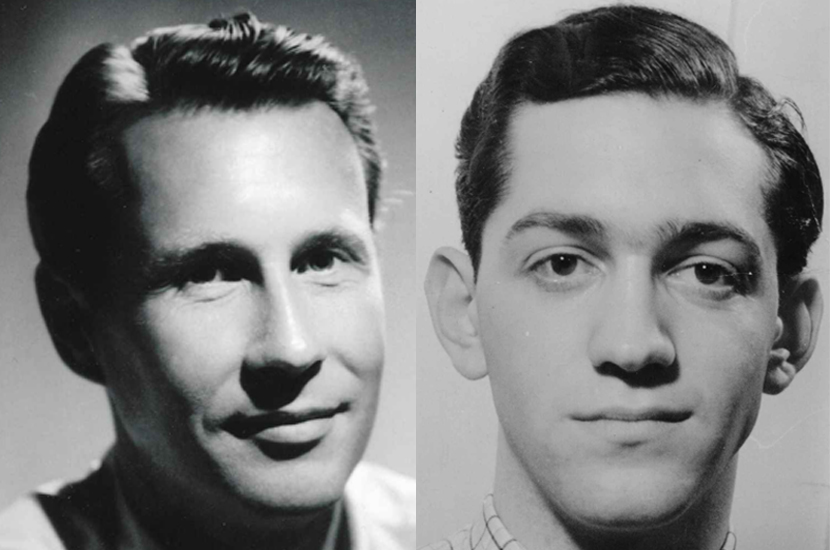When times are hard it helps to remember those who’ve endured far harder times. I remember my friend Manfred Alexander, who escaped from a concentration camp and hid in my grandfather’s flat in Berlin during the second world war. The month he spent alone in that apartment was far harder than any self-isolation I’ll ever face, yet he survived and prospered.
Manfred Alexander was born in 1920, into a bourgeois German-Jewish family, and became friends with my Gentile German grandfather in Berlin in the 1930s. Growing up in Berlin, Judaism wasn’t a big part of Manfred’s identity. It was only when he was expelled from school for being Jewish that he learnt who his Jewish classmates were. Cut off from respectable society, he drifted into more bohemian circles, where he met my grandfather, Werner von Biel. Werner grew up in a schloss on the Baltic Coast, but as the youngest son he had no claim on the estate. He lived beyond his means and sank his yacht for the insurance money and was caught and went to prison. His wife, my grandmother, left him, and took their children with her. Ostensibly he had nothing in common with Manfred, but they were both outcasts in Hitler’s Reich.
In 1941 Manfred and his parents were arrested, and transported to a concentration camp in Minsk. After he’d been expelled from school Manfred had retrained as a brick-layer, so in Minsk he was put to work rebuilding the railway station. There he befriended a German railwayman, who smuggled him on to a troop train taking wounded German soldiers back to Berlin. He had to leave his parents behind. He never saw them again. Back in Berlin he met up with Werner, who offered to put him up in his apartment, on Grolmanstrasse, opposite the police station. Naturally it was a big risk but Werner had nothing much left to lose.

Werner didn’t stay in the flat (he said it’d be safer that way) and he didn’t tell Manfred where he was staying (he said it’d be safer that way, too) so Manfred was all alone for days on end. He had to be completely quiet, lest his neighbours hear. Every few days Werner came to see him. He brought him food and clothing. Eventually, Werner found some people-smugglers who agreed to get Manfred out of Germany, the long way round, through Luxembourg into France and then on into Switzerland. They’d smuggle anyone if the price was right. Somehow, Werner found the money.
Manfred made it into France, but when he reached Besançon all hell broke loose. The French Resistance had killed some German soldiers, and now the Germans were herding suspects into barns and burning them alive. In desperation, Manfred sought sanctuary in the Catholic church. The priest met him at the door. He was blind. The priest ran his hands across Manfred’s face. From this he could tell that Manfred was telling him the truth. He hid Manfred in the crypt. A few days later, Manfred crossed the mountains into Switzerland. He spent the rest of the war interned in Switzerland — another sort of isolation. After the war, he emigrated to the USA and became a caretaker in New York.
Isolation forces us to work out what really matters. It teaches us who we really are
I never met my German grandfather (he died when I was a child) and my grandmother never spoke about him, but in 1999 I met Werner’s second wife, his widow, and she put me in touch with Manfred. I visited him in New York and got to know him fairly well. As a result of an article I wrote about Manfred’s great escape, Werner was posthumously awarded the Righteous Among the Nations medal by Yad Vashem, Israel’s Holocaust Remembrance Centre. On it was inscribed: ‘He who saves one life saves the entire world.’ In 2005 I went to New York to receive the medal on my grandfather’s behalf, alongside Manfred, at a ceremony at the Israeli consulate. Manfred made a fine speech. That was the last time I saw him; he died a few months later.
I learnt from Manfred’s story that self-isolation is a perennial part of human life, of human history. Christ was tempted in the wilderness, Martin Luther translated the Bible into German in isolation, in Wartburg castle, and Dietrich Bonhoeffer wrote his theological letters in isolation, in Tegel prison. Of course it’s heartening to reflect that our current isolation isn’t nearly as bad, but that’s only half of it. Isolation forces us to work out what really matters. It teaches us who we really are.
Who was Werner? And who was Manfred? Both men were contradictory, as all men are. Werner was a fraudster, a bad husband and a dreadful father, yet if he hadn’t ended up in prison, in isolation, he never would have met Manfred or been able to help him. His criminal connections kept Manfred alive. Werner’s postwar life was mundane and uneventful. Only the manner of his death matched the drama of his early life. In 1972 he fell out of a train in Switzerland. The official verdict was accidental death but my grandmother always believed he had been murdered.
Manfred had a unique talent for persuading people to risk their lives to help him — he was the only known survivor of that camp in Minsk, the only known escapee. That talent never left him, but surprisingly it didn’t bring him much material success. He lived in a drab walk-up apartment in Queens. He had no children. Yet if he hadn’t been expelled from school and been forced to become a bricklayer, he never would have escaped from Minsk. What looked like a great misfortune turned out to be his greatest fortune. Bricklaying saved his life.
The three men who risked their lives to save Manfred’s life were all damaged in some way. The railwayman was illiterate, the priest was blind, and my grandfather was a jailbird, a man who’d lost his reputation, his birthright, his family. The people who help us through are never the people we expect. How many Pharisees expected the Messiah to be a common carpenter from Nazareth? Our current ordeal will inspire extraordinary deeds in people we always assumed were unexceptional. And maybe it will help us find the exceptional in ourselves.






Comments